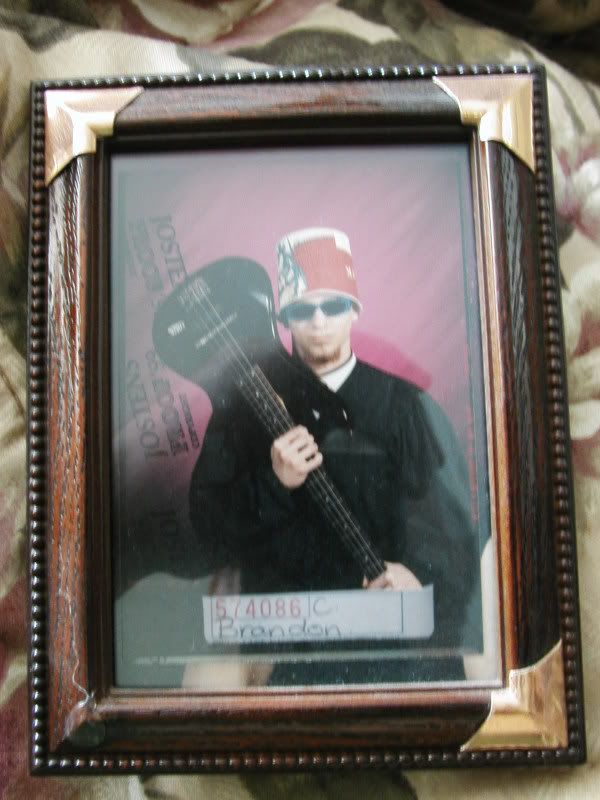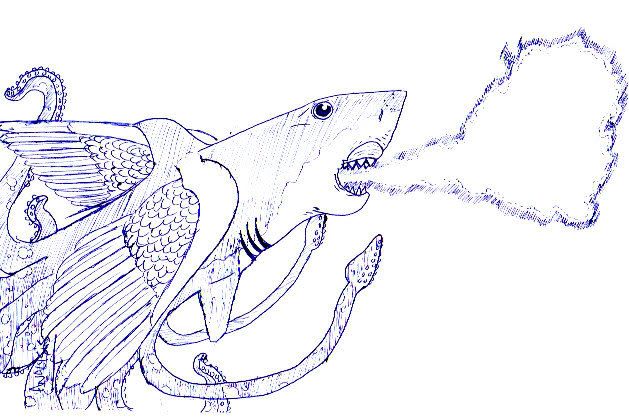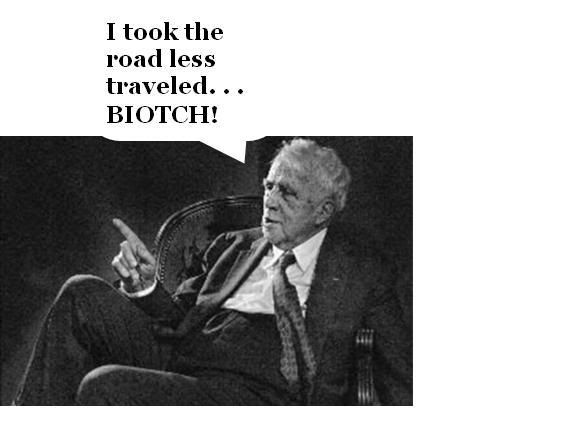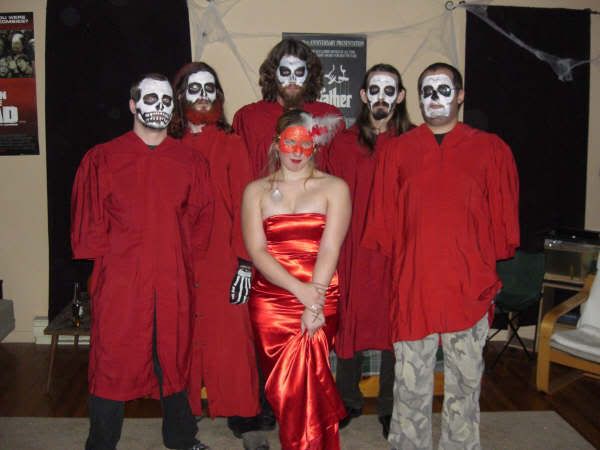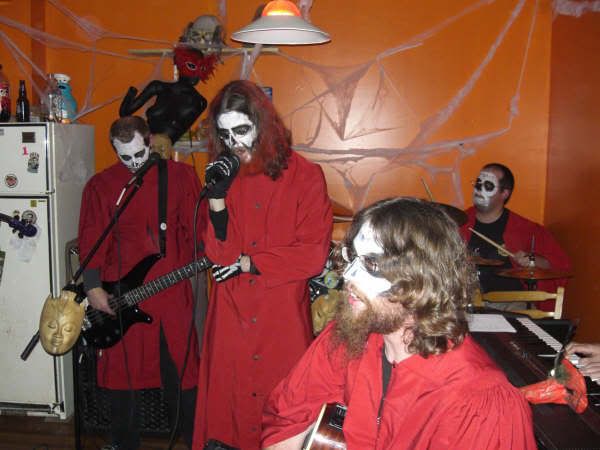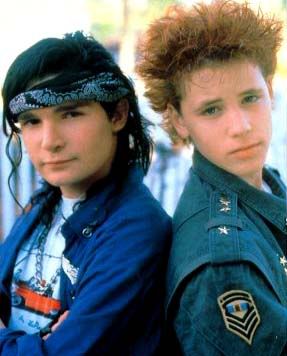TWO MEN ENTER. . . ONE MAN LEAVES.
This is the other essay I've been stressing about, hopefully the mark turns out to be a good one. This is the longest essay I've ever written. NEAT.
Enjoy(?)
(again don't copy this essay or you'll get all failed and stuff)
Chris Brandon
Marx or Sartre? An Educational Conundrum.
Jean-Paul Sartre and Karl Marx were two men separated by nearly a century. Both men would develop theories on the true nature of man that would be thought about and debated for many years after their deaths. Marx’s theory would involve economics and the continual war between classes that he could only see ended with a revolutionary Communist uprising against the oppressive ruling class. Sartre’s theory involved only one person, yourself, and all that was needed for revolution was the realization that the only thing you could control and you must control, is yourself and the understanding of your freedom to choose is tantamount to becoming a complete person. Their theories are quite different and yet have many similarities, much like the human race when compared against itself. In regards to education it would be difficult to assimilate one’s theories into the other and it would be impossible to please both men’s ideologies within one educational institution. Although this is true, we are all different, and some respond in a more positive or negative way when provoked with different stimuli than others; people tend to be very subjective and in the end I think this makes it impossible to choose one system for all. If one was forced to choose an ideology from either man, however, the Communist theories of Marx’s unified proletariat would be more appropriate for application in the educational system than would Sartre’s theories of individualist Existentialist freedom.
Sartre was a very complicated fellow and his philosophy followed suit, but his main supposition was that you make yourself who you are. Existence comes before essence. Given that this is obviously a simplification of a complicated concept, I will attempt in the next few paragraphs to summarize Sartre’s concept of Existentialism.
Sartre believed that in order to truly exist one must be determined to make an effort in one’s decisions to be. Man is alone, unjustified and irredeemably free. Masters (1970). How does this freedom manifest itself? By making choices in every new situation and finding justification in those choices, good or bad. We have not chosen this freedom, yet we must be free as Sartre believes this is our only option. There is no escaping our freedom to choose. Even if you refuse to choose a path, you are choosing the path of apathy. Not to choose is an impossibility. Making choices about your own life for yourself, according to Sartre, is to be courageous because you cannot know if you are right or wrong; you can only be free and take the chance.
Before I go any further I must explain one of the more recurring and important concepts of Existentialism: La Mauvaise Foi or Bad Faith. Since Sartre asserts that existence is a meaningless yawning void of nothingness and the only thing governing it is one’s ability to choose, it is easy to see how a person might refuse this freedom because to claim ultimate responsibility over your own life is a heavy burden to bear that most people do not want or cannot handle. This refusal is what Sartre calls mauvaise foi. Masters (1970). Sartre believed that this refusal of freedom was the worst crime a person could commit. This refusal of freedom entails a person attempting to become an object by harbouring a disbelief in the fact that in order to be one must choose. This is an attempt to escape the responsibility of doing anything to make his or her life meaningful. Masters (1970). It is through the choices we make that we become who we are. These choices help us to understand what meaning our lives have. One cannot be described by attributes because a personality is not mere characteristics like an object is. One can only be described through actions, so what one does is the only way one can be known. Masters (1970).
According to Sartre there are no absolutes; everything is relative to a situation. The ideas of Good and Evil are not permanent but instead vary from situation to situation. Morals should be followed, however, if one sees that those morals are just. One cannot choose to be responsible or irresponsible, one only chooses how that responsibility will be expressed. Humans must act by making difficult personal choices rather than following written orders. It is because of this that making any choice carries a great responsibility in Sartre’s terms. Masters (1970). We are free to choose, so all choices are of our own doing. We cannot pass the blame onto genetics or God or society. We choose our actions and are therefore totally responsible. We cannot ‘be’ (like a thing), we can only become. Every person is responsible for themselves and all of their actions.
There are three types of being according to Sartre: being-in-itself (existing as an inanimate thing), being-for-itself (existing as a person) and being-for-another (existing in regards to another’s perception of yourself). Type one (being-in-itself) are items classified as things; they simply are and do not become anything. Type two (being-for-itself) are not things, they are unstable and unpredictable; type two are aware humans. Type two is always in the state of becoming. Type three (being-for-another) can only happen to type two (people) and not type one (things) as it is the awareness of another’s consciousness that has an effect on one’s own consciousness. WebCT Power Point (2006)
Sartre does not believe it is productive to only know, understand or think. These concepts cannot create anything new, these cannot invent. In order to become, one must be in a continual process of renewal. Man can never define who he is by thought alone, regardless of how great. Real answers lie in doing. For Sartre writing was his action, his choice that made him be free in a type two (being-for-itself) sort of way. Masters (1970).
Sartre was decidedly humanist which means he rejected the importance of God or any dominant moral code and put emphasis on science and human reason. Human life is only as good or as bad as we make it. If life is good there is no one to thank, if life is bad there is no one to blame. Humanity is only what it does and has no innate nature. Sartre believed God is an excuse that people use in defense of their refusal to choose, or ironically – bad faith. Sartre believed that even if God did exist He wouldn’t matter. People would still have to choose what was good and what actions they would take. Masters (1970). God does not, according to Sartre, belong in the realm of existence and reality. Since the search for God is a futile one, the search for oneself is the only meaningful search.
Sartre’s view of life is mostly optimistic despite some of his negative terminology. Life has no meaning until we give it one and the future is very prominent in Sartre’s philosophy since we are constantly becoming. Being unable to act, according to Sartre, is life’s greatest tragedy. Masters (1970).
Marx’s theory of human nature is slightly easier to comprehend than Sartre’s since Marx believed himself to be more of an economist than a philosopher. To begin and get a general understanding of what Marx was all about he said, “If man is formed by circumstances, these circumstances must be humanly formed.” Stevenson & Haberman (2004). Marx believed all of the important changes in human history could be sourced back to one particular thing: socioeconomic class.
Human society has been divided into classes or a similar concept since the widespread demise of the hunter-gatherer way of life. Marx divides these classes into two main classes, the Bourgeoisie and the Proletariat: the property owners or the wealthy, and the labourers or the poor. The proletariat owns nothing. The only thing they possess is their labour, and that is sold to the ruling class. Labour and capital have opposed interests. Labour for a boss may earn a worker money but it also alienates him. The boss gets his money and his product and his labour, the worker is left with a mere percentage of the final product. Del Rio (1976). “The more value he creates, the less value he has . . . labour produces fabulous things for the rich but misery for the poor.” Marx (1844; cited in Del Rio, 1976). This act of exploitation depersonalizes man. The labour of the many (proletariat) becomes the capital of the few (bourgeois). Marx believed the most fundamental need of man, to create, has been turned into possession and private property. Del Rio (1976). Simply, the more a person buys/owns, the less they keep of themselves.
Marx believed all the problems in the world can be traced back to the defense of private property. Class struggle has always existed and likely always will, at least until the worldwide Communist revolution takes place. As long as one class profits from the exploitation of another there can be no social harmony. The capitalist system exists solely to create profit and this profit is based on exploitation and the obtaining of private property. This property is obtained by exploiting the labour of the working class; most of whom are unaware of being exploited and just accept this system as the way things are. “What you have is what you’re worth.” Del Rio (1976).
One of the most prevalent concepts of Marx’s ideology is alienation. Alienation is the sense a person gets when what belongs to them is extorted. In the capitalist system that existed in Marx’s time and ours, the working class are alienated from themselves, their work, nature and from other people. WebCT Power Point (2006). Alienation depersonalizes and objectifies the worker making him or her a cog in the capitalist money making machine.
Marx was a materialist in the way that he was not an idealist. He therefore believed that there was a scientific reason behind what was happening with people and used logical arguments to find truth. WebCT Power Point (2006). Marx believed man was not self determined, but he also did not believe man’s fate was decided by God. Marx believed that the actions of men were caused by socioeconomic factors.
Although they had many differences Marx and Sartre also had many similarities. After some study into their respective philosophies and ideas I was not surprised to find out that Sartre eventually became a supporter of the Communist Party. Stevenson (2004).
“Freedom is so much the essence of man that even its opponents realize it . . . No man fights freedom; he fights at most the freedom of others. Every kind of freedom has therefore always existed, only at one time as a special privilege, another time as a universal right.” – Karl Marx. Dunayevskaya (1958).
Marx and Sartre shared this thought that freedom was undeniable. The essence of man, as Marx says, is freedom and the building block of Sartre’s philosophy is man’s freedom to choose.
Marx said, “Philosophers have only interpreted the world, in various ways; the point is to change it.” Del Rio (1976) This statement made by Marx illustrates clearly that the two men had some common ground on thinking and doing. Sartre expressed quite adamantly that thinking and studying were nothing compared to doing and was very supportive of social and political action. “There is no cemetery like a library.” Masters (1970). This not so subtle metaphor demonstrates Sartre’s agreement with Marx that studying the past will not help one to become. Reading about past events does nothing to help justify the now. These comparable statements made by both men about eschewing thought without action could either be looked on favourably or unfavourably by an educational institution. On one side of the spectrum it could be looked upon as applied learning, where a student learns something new and then puts it into practice or applies it to everyday life. This concept is very much a part of the current educational reform here in Quebec. On the other more conservative side it could be looked upon as a rejection of the study of history and the ways of the past. The thought of either Marx’s revolutions or Sartre’s radical freedom of choice may be too worrisome a topic for some more cautious educators.
“Sartre’s view of human reality stands in absolute opposition to the orthodox Marxist view, which regards man as an object in the stream of history. Sartrean existentialism, on the contrary, insists on the importance of individual human dignity and freedom.” Masters (1970).
Sartre believed people had the ability to choose to do or be anything; people could never be mere objects to be acted upon by outside forces. Everything we do or say is our own decision to make and no outside force can change that, socioeconomic or not. This is the main point of divergence between the two men’s theories and will stop their two theories from successfully blending together. Specific ideologies like Marxism, limit individual human freedoms and for Sartre to allow a code of values to interfere with freedom is unlikely at best. Masters (1970). At the same time, Sartre’s individualism conflicts with Marx’s hope for harmonious communal living and working. In order for people to live and work together in peace they must at least use the same system of values or the conflicting morals will cause an unbearable dissonance in their relationships. An example to illustrate this point would be a situation involving two students working in a group, one who was raised to follow rules, play fair and do as he was told, and the other student who was raised to do what ever it took to win and that even cheating was acceptable if it was truly necessary. These two people would not be able to work together harmoniously because their set moral structures would be incompatible and would conflict on a nearly all points while trying to complete the assignment.
In the case of Sartre one would assume that education would be held in high regard since how else except with knowledge would someone be able to make choices in life that are good, as in, informed and responsible? I think Sartre would put particular stress on teaching the importance of accepting your freedom and integrating that freedom into the choices you make on the path to becoming. At the same time a conflicting point arises in regards to schooling where Sartre would not want a free man to affiliate himself with any set code of values; to encourage living for others or making choices that conform to a set structure, therefore being decisions which are not truly free. Since all schools possess an environment of rules (which can sometimes be quite strict), regulations and moral codes, it would difficult to please Sartre in the present North American system.
For Marx education is important, but only if it is tailored to the proletariat in teaching them how rise up against their oppressors the capitalists and/or on how to live communally. Marx did not believe education to be very helpful as it stresses the conformity of children into a class system. WebCT Power Point (2006). The school itself is a class system that is very open to possibilities of alienation. Education in schools would not be powerful enough to lead the students on to social change since to bring about social change the students would need to be deeply involved and it is very hard to make students interested enough in what they are being taught to become that involved. Marx would require a school that was not an institution, as nearly all institutions are run by the state or the ruling class in order to mold the children into good citizens who obey the hierarchical/oligarchic demands of a capitalist society.
In an ideal Sartrean school, students would have to be treated as free individuals. Discipline would be interesting in such a system as blame could not be passed on to someone else since all the students are free to make their own choices. The only rules the students would have to follow would be the rules they set and accept for themselves. Therefore telling a child that they had done wrong when they do not themselves believe what they did was wrong would be incredibly difficult and hard to explain, especially to a younger child raised in an Existentialist culture. Emphasizing how each child is unique and special would be a positive encouraging factor, however, in a Sartrean school.
In a school following Marx’s principles the students would be taught that they are not unique but part of a whole. They would be shown that they are a class that will be the ruling class through strength, revolution and unity. In my opinion this would be equally as positive and encouraging a situation as Sartre’s hypothetical school where everyone is taught that they are unique. It is a very different view but the sense of unity that would need to be imbued in the students would be a powerful experience. It would be very empowering to know the capabilities of one’s unified group against those that would oppress and exploit them. Marx’s school may not be able to prevent the feelings of alienation the students would no doubt feel since they are teenagers in an institution giving up their time and labour for marks, which in the school system are a form of currency. At the very least they would be taught about the concept so they would understand this feeling of alienation and be equipped with the knowledge to fight against it.
All students would be important and no one would be left behind because for the proletariat movement to be strong, all of the students must be strong and willing to work together closely. Learning how the very existence of socio-economic class is detrimental to their quality of life would inspire the students to work towards a classless society when they leave school. Teenagers in high school are often at a point where they are searching for something to believe in and a positive ideology that is egalitarian and revolutionary would be appropriate for them to cling to. Most teenagers do not feel like they are treated equally as they are no longer children and not yet adults so the idea of an equal proletariat would be very tempting. Also, since teens are often rebellious, the revolutionary portion of Marx, rising up against the bourgeois, would be difficult to resist for almost any high school youth. Again the unity within the school and the student sense of community would be an affirming addition to any school.
In elementary schools my opinion is that a great deal of emphasis would have to be placed on co-operation and sharing in order to prepare the children for the coming communist system. The concept of private property would be a difficult concept to remove from society and would need to start at the youngest age possible. Perhaps even to remove the word “mine” from the school yard lexicon.
The attitudes of the teachers in this Marx inspired school would have to be quite different from that of many teachers in schooling most of us have participated in. By this I mean the teachers could not be distanced authority figures who control the students as if they were police, but must be more like a part of the student body. The teachers would need to equalize with the students and not be seen as dictators but as comrades in arms in the proletariat class. Perhaps the use of a higher percentage of student teachers, group discussion, hands on involvement and student teacher co-operative activities would be helpful in propagating this unified environment.
I believe learning in Sartre’s school would take place much in the same way as learning in adult education centres. In an adult education environment the students are given more one on one time and are encouraged to work at their own pace. The students become responsible for doing their own work. At the beginning of the term the students receive a workbook that they must complete by the end of the term. They choose how quickly or slowly they advance. If a student is dedicated enough it would be possible to complete more than one grade level in a year, but if the student chooses to they can remain at the same level for as long as the institution allows. This way each student is independently responsible for their own success due to their choices. For many students this environment is ideal. Examples of students who benefit from this mainly Sartrean school system are: students who have problems with authority figures, students who work better on their own, students who are gifted and are held behind by the grade level system or students who are slower and need to work at their own pace.
The Sartrean teachers would need to be careful not to impose their morals on the students but to act as guides on their journey of self discovery. Having a teacher as an authority figure could easily cause an eager student to fall prey to living-for-another by working hard not for their own satisfaction but to receive praise from the teacher or admiration or jealousy from the other students. Peer pressure would also continue to exist in this system for the same reason.
The radical freedom presented in Existentialism is a very difficult concept to place within the constraints of traditional schooling or in fact in any institution. I myself struggled with the concept without even knowing about Existentialism some years ago. When I was eighteen I moved out on my own for the first time and after a few weeks I realized that the only rules that truly existed for me were the ones I made for myself, all other rules only really existed if I chose to follow them. After I discussed it with my girlfriend, who disagreed, I understood that even though that was true in a sense, I still had a moral code of ethics ingrained within in me and I could not justify breaking that code just because I was technically free and felt able to do what I wanted. I was and am affiliated with a structure of morals so in Sartre’s eyes I am not truly a free man. Regrettably in order to operate in the society I live in I must conform to that code or risk being arrested, institutionalized, or at the very least fired from my job or being flunked out of university. Unfortunately I believe this would be the case for most people attempting to adopt Existentialism. It would be difficult to teach children and teens to not be selfish with their freedom. Responsibility is something that comes with age, and even then many people never really develop that sense of responsibility. To tell your students they are free to choose and that they shouldn’t connect themselves with any code of ethics is a dangerous path.
The teachers in a Sartrean school would need to be very mindful of how they treat the students. It is always possible to see the students as archetypes like, class clown, the slow kid, the bad kid or the overachiever when the students should be treated subjectively. WebCT Power Point (2006). Sartre believed that people could change from moment to moment and because of their freedom to choose they could not be compartmentalized into one schema. Due to their freedom of choice, a student who is the class trouble maker one day could be the class over achiever the next day if she so desired because of the subjectivity of her decisions. Masters (1970). The teacher would need to really get to know the students and try to understand them as the individuals they are. This would require smaller class sizes and more interactivity between the student and teacher to foster awareness of the student’s and teacher’s true selves in the school.
In Marx’s school it is a possibility that if the teachers don’t do their job quite to the standards of Marx’s communal utopia the school itself would become a class system where the teachers are the bourgeoisie exploiting and alienating the proletariat students. There is even the possibility of a student proletariat uprising, which might be just what Marx would hope for, a microcosm for future revolts. Afterwards the students may even end up teaching each other although it is difficult to predict as most cultures of revolution in history will often revert back to a similar structure that was overthrown by the revolution; only with different leaders like in Stalinist Russia or the example of the pigs offered in George Orwell’s Animal Farm. A problem that comes to mind with Marx’s communal school, perhaps due to my being raised in an individualistic capitalist society, is the issue of conformity. In the communist system it seems that conformity is idealised, yet in our culture, especially with youth, conformity is often seen a negative concept. Even though it would be conforming to an ideal egalitarian way of life, there would always be those individualist few who would rebel against such social controls. As with all ideals, Marx’s is difficult to achieve, or at least difficult to envision within the constructs of today’s capitalist society.
The problem with trying figure out how people should live their lives, how they should be ideally educated and what causes them to do what they do is that everyone is so different and at the same time paradoxically similar. Attempting to find one theory of human nature that can encompass everyone is a nearly futile endeavor. Fortunately it is not entirely futile as philosophical studies yield the result of self-education and a deeper understanding of who we are and why we do what we do. I do not believe we will ever find the one true answer, or if we have already, I do not believe that we will ever all agree on what it is. Within education and the spectrum of Marxist or Sartrean methods it would appear that Marx’s methods are more universally appropriate for the schooling model. Sartrean methods, however, would perhaps be employable within the Marxist system in exceptional cases for those who have problems fitting the mold of the unified Communist whole. The Marxist system would benefit both the students and the teachers by amalgamating them into one educational body, ending the divide between them. Jean-Paul Sartre himself, in his later years, said, “Marxism is the philosophy of our time –we cannot go beyond it because we have not yet gone beyond the circumstances that engendered it.” Del Rio (1976).
References
Atkinson, D. (2006). WebCT Power Point. Lennoxville, QC: Bishop’s University.
Del Rio, E. (1976). Marx for Beginners. London, UK: Writers and Readers Publishing Co-operative (Society Limited).
(Note from Chris - if you want to learn about Marx, this would be the book.)
Dunayeveskaya, R. (1964). Marxism and Freedom . . . from 1776 until Today. New York, NY: Twayne Publishers.
Masters, B. (1970). Sartre: A Study. London, UK: Heinemann Educational Books Ltd.
(Note from Chris - if you want to learn about Sartre, this would be the book.)
Stevenson, L., & Haberman, D.L. (2004). Ten Theories of Human Nature (Fourth Edition). New York, NY: Oxford University Press.
UPDATE: I ALSO GOT A 90% ON THIS ESSAY. RAD. This is a thrid year course and I'm only a first year. Fu-Schnickens dudes. Fu-Schnickens.

